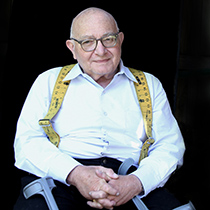
By Ben Lewin
My relationship with our movie project, Sylvia and the President, goes beyond the professional. It is deeply personal. I was one of the ‘polio generation’ who contracted the virus in the early 1950s, just before the advent of the Salk vaccine. My body was 80% affected in the acute stage, but I was gradually rehabilitated to the point where I could walk on crutches and achieve a real level of physical independence.
Economic independence was another thing. I looked very different, and adverse conclusions were often drawn about my physical and even mental limitations. In my first years of school, I was taught basket-weaving, on the assumption that this, or something similar, would be my likely contribution to society. Later, I was rejected for a government desk job on the basis that I was a potentially high-risk and high-maintenance employee. The only way forward through this bewildering maze of social prejudice was self-assertion.
For most of my working life, I have earned a living as a filmmaker, but it has not been easy. Even in the ostensibly liberal film world, disabled inclusivity is a pretension more than a reality. It is a world obsessed with image and appearance, and dominated by commercial algorithms and Wall Street shareholder imperatives. I am currently the only working director with a visible disability in the Directors Guild of America. What does this say?
Sylvia Flexer’s story is the story of the first historic battle for the dignity of disabled workers and their recognition as useful members of society. It is the same battle that is still being fought today. If I had been there, in Sylvia’s time, one of her polio generation, I would have been a member of the League of the Physically Handicapped, fighting alongside her.
The fact that the disability rights movement actually began in the 1930s is little known outside academic articles and contemporary newspaper reports. Even less well known is the cruel irony that, at that time, disabled workers were discriminated against by an administration led by a president in a wheelchair, who went to great pains to hide the truth of his condition from the American public. Sylvia and her fellow protesters were largely responsible for pushing FDR into a greater consciousness of disability rights, providing jobs for disabled workers under the New Deal, and later setting up the March of Dimes which, ultimately, led to the development of the polio vaccine.
Our mission now is to create an impactful and original feature film (Sylvia and the President) which will illuminate Sylvia’s story and inspire others with her example. We have a powerful script and have cast three excellent disabled actors in the lead roles, including Oscar winner, Marlee Matlin. We trust that, in carrying this message, we stand on common ground with Rotary and hope that this outreach will give impetus to the production of this important movie.
Learn about Rotary’s efforts to eradicate polio
https://blog.rotary.org/2025/01/07/movie-shines-spotlight-on-disabled-workers-battle-for-dignity/
